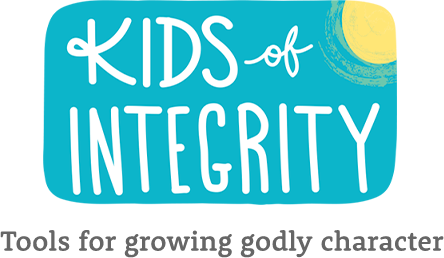Consideration

Kick-off craft
Plan to do this kick-off craft early in your lesson. You will make tissue-paper flowers to teach your kids the importance of treating people with care and consideration.
Tissue-paper flowers
Directions
You will need the following supplies:
coloured tissue paper
green paper to make foliage (optional)
stiff wire in lengths of 30-40 cm (12-15″)
green pipe cleaners
scissors
a ruler
a spritz water bottle
a vase for your flowers.
- Plan to make one flower of your own that will be destroyed as an object lesson as you work through the discussion questions. Here’s how to make your flowers:
- Cut the sheets of tissue paper into rectangles measuring approximately 20 x 25 cm (8 x 10″).
- Lay several sheets of tissue paper in an even stack (4-6 sheets make thinner flowers and 15-20 sheets make fuller flowers).
- Fold the stacked tissue paper like an accordion, widthwise, with each fold being 1.5 cm (½”) from the next. Continue until the entire length is folded.
- Cut both ends of the folded tissue – round for scalloped petals or zig-zagged for jagged petals.
- Tie the stack of folded paper at the middle with a green pipe cleaner. (Wrap it right around the stack, then pull it tight.)
- Holding one end of the accordion stack of paper, carefully pull the tissue paper upwards at the other end, one layer at a time.
- Gently separate the sheets to form a flower shape.
- Once you’ve formed your flower, wind the pipe cleaner onto a length of stiff wire that will serve as the flower’s stem.
- If you would like to add foliage, cut leaf shapes from your green paper. Lay the end of the leaf along the stem and secure the leaf to the stem by twisting a short length of green pipe cleaner around both the leaf and the stem. Continue adding leaves until each stem is leafy.
- As your kids are working on their flowers, use the discussion questions to talk about how people’s feelings, like flowers, are fragile.
- Choose a Scripture verse from this lesson and memorize it as a reminder of the importance of acting and speaking with care and consideration. Add the verse to the vase of tissue-paper flowers by adding a different phrase of the verse to the stem of each flower. As you work on memorizing it, hold up the flowers in the correct order and have your kids say the corresponding phrase.
Questions for discussion
- How easy is it to tear the tissue paper?
- Which tears more easily: paper tissue or real flower petals?
- What other things can you think of that are fragile?
- How are people like flower petals?
- What do people do to “tear into” others?
- What do you think would happen if I sprayed my flower with water? (Spray your flower with water and observe what happens.)
- If a flower gets all droopy, what do we say happened?
- When we say a person looks “wilted”, what kind of expression would we see on their face?
- Could a person “wilt” or “tear” in a way that we don’t see from the outside?
- Why do you think people are thoughtless or inconsiderate of each other?
Read Proverbs 18:21.
- The Bible says the tongue has the power of life and death. What do you think this means?
- Has anyone ever said something unkind to you?
- What do we call it when someone tells friends and classmates unkind things about someone else? (Gossip / spreading rumours)
- If you hear someone say something unkind about another person, what is the best way to respond?
- What is the best way to care for a friend who is sad?
Key concepts
Just as we needed to be very careful with the tissue paper when we were making the flowers, we need to be very careful not to hurt other people by the things we say or do. People can be like flower petals because our hearts are also very delicate – people’s feelings can easily be hurt.
Simple comments, facial expressions and even the tone of voice we use when talking with someone can easily hurt their feelings and give them a sad heart. For example, someone might say something like, “That was a silly idea,” or “Your pants look funny,” and could end up making another person feel embarrassed.
The Bible says we can speak “life” or “death” to others. We speak “life” by saying things in a gentle, loving, considerate and respectful way. We also speak life when we encourage others or when we offer correction in an appropriate way.
We speak “death” when we say things in an abrupt, blunt, inconsiderate or disrespectful way. Being quick to criticize or correcting abruptly or aggressively is another way people speak “death” rather than “life.”
When a flower gets droopy, we say it is dead or “wilted.” Likewise, if we say unkind things to another person it can be very disheartening or discouraging for them. This is kind of like when we sprayed the tissue paper with water: it got all droopy. The paper may dry over time, but the flower won’t ever be the same. In the same way, cruel words can be very damaging. Often a person can still remember what was said to them many years later.
If we hear unkind or cruel words being said, we can say, “I wouldn’t want a friend talking like that about me, so let’s not talk about them that way.”
When we speak unkindly or repeat unkind things said about another person, we are not considering that person’s feelings. If you are tempted to speak unkindly to someone, remember that people, like flowers, are fragile and easily damaged!
Relevant Scripture
Ephesians 4:29 “Let no corrupting talk come out of your mouths, but only such as is good for building up, as fits the occasion, that it may give grace to those who hear.
”
Proverbs 10:11 “The mouth of the righteous is a fountain of life, but the mouth of the wicked conceals violence.
”
Proverbs 18:21 “Death and life are in the power of the tongue, and those who love it will eat its fruits.
- Acceptance
- Adaptability
- Attentiveness
- Christmas
- Compassion
- Confidence
- Consideration
- Contentedness
- Cooperation
- Courage
- Courtesy
- Discernment
- Easter
- Faithfulness
- Forgiveness
- Generosity
- Gentleness
- Gratitude
- Harmony
- Honesty
- Humility
- Joy
- Kindness
- Obedience
- Patience
- Perseverance
- Respect
- Responsibility
- Reverence
- Righteousness
- Self-control
- Thanksgiving

